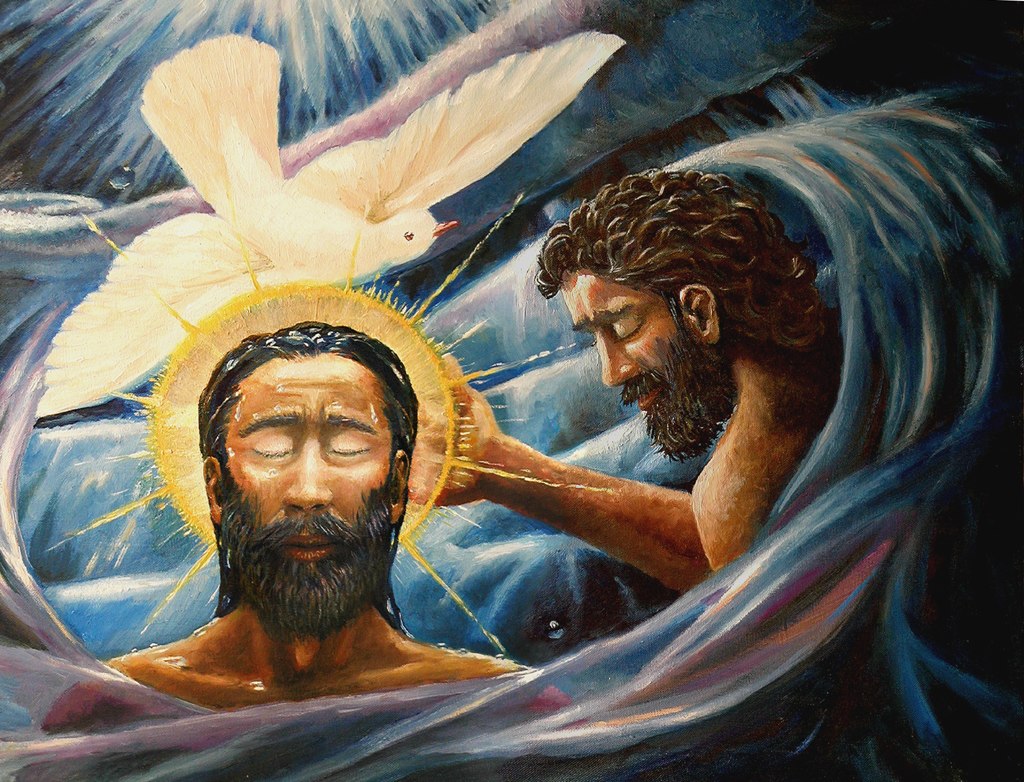Or, why a party at a funeral?
I always want to throw parties and have people over. Except that it’s so much work throwing a party. Thinking about it is exhausting. And so is cleaning the house. But when people are over, I love it. It brings me so much joy.
Ever wonder why Jesus went to so many parties?
Going to parties is actually a hallmark of his ministry—though you might not know it if you listen to too many serious sermons about serious topics from serious Christians. But Jesus actually got in trouble because the religious leaders thought Jesus did too much feasting and not enough fasting, too much partying and not enough praying (Luke 7:34).
All the parties came from one place—the baptism of Jesus. Indeed, the one thing we forget about Jesus’s baptism is that it was an event of joy.
But before we can understand that, we need to understand why Jesus was baptized in the first place.
Baptism: Entering the Realm of Death
Jesus was baptized by a John in the Jordan River, a baptism for the forgiveness of sins (Luke 3:3). But—we might ask—if Jesus never sinned (Heb. 4:15), why was he baptized?
While Jesus was without sin, he entered the realm of sin, the realm of death. Death comes through sin. And sin comes through shame, the fear of losing face, or losing relationship (see Romans 5 and Genesis 3).
 And shame—where does shame come from? Shame comes through feeling defective or deficient (“There is something wrong with me.”), and through feeling displeasing to another (“There is something wrong with us.”). These feelings of deficiency and displeasure create doubt in us and between others, causing us to withdraw and hide (psychiatrist Curt Thompson gives a brilliant reading Genesis 3 as the result of shame in his Anatomy of the Soul, ch. 11).
And shame—where does shame come from? Shame comes through feeling defective or deficient (“There is something wrong with me.”), and through feeling displeasing to another (“There is something wrong with us.”). These feelings of deficiency and displeasure create doubt in us and between others, causing us to withdraw and hide (psychiatrist Curt Thompson gives a brilliant reading Genesis 3 as the result of shame in his Anatomy of the Soul, ch. 11).
Sin enters through shame as a false solution to a broken relationship. All the ways we cheat, steal, lie, hide, and run come from attempts to overcome these feelings of deficiency and displeasure. All our addictions and compulsion seek to overcome these feelings of being deficient and displeasing.
The universal cycle of the realm of death is 1) to hide, because 2) we are afraid, because 3) we are naked. As Thompson says, “We inhabit a world in which we have inherited..the tendency to hide in response to the fear that is evoked by awakening to our vulnerability” (Soul of Shame, 111). Or as Thompson says elsewhere, shame disintegrates our relationship, putting us face to face with “death—the subhuman, withering, devolving existence of comprehensive isolation…” (Anatomy of the Soul, 214).
Shame leads to sin. And sin leads to death—physically, relationally, and spiritually.
So, Jesus—fully human and yet without sin—lived in this realm of death. And in his baptism, he entered the realm of death, receiving it as his own lot in life.
Baptism: Bringing the Realm of Joy
And what did Jesus bring with him when he entered the realm of death? Certainly he brought life. But more specifically, Jesus brought joy!
Definition of Joy
Joy is not happiness. Joy is much more relational. Joy is the experience of being in the presence of someone who is delighted to be with you. Joy is the overflow of being in the presence of love, of one you love and who loves you in return.
Psychologists and neurologists are coming to the conclusion that connections of joy are the most crucial developmental task (Soul of Shame, 60). And joy is not only necessary for proper interpersonal development, but also for the creative exploration and transformation of our environment. Joy helps us both stay in relationship and go out and explore the world (Soul of Shame, 112). Joy changes everything.
In a world enslaved by shame and sin, humanity is in a low joy environment. Indeed, the realm of death lacks the joyful presence and purposes of God.
Foundation of Joy
But in Jesus’ baptism, we see the joy of the Lord come into the world. Being attentive to the crucial aspects of joy, we can see how foundational this event was for Jesus’ mindset and ministry.

Here is the text from Luke:
When all the people were being baptized, Jesus was baptized too. And as he was praying, heaven was opened and the Holy Spirit descended on him in bodily form like a dove. And a voice came from heaven: “You are my Son, whom I love; with you I am well pleased.” (Luke 3:21-22)
A couple of things to note. Only Luke notes that Jesus was praying as he was baptized. Jesus was pursuing relationship with God. Then the heavens were opened and presence of God comes down in the Spirit. And the pleasure of God is expressed in the voice of the Father.
Jesus—if he wasn’t already—is filled with joy because he experiences the presence of God (through the Spirit) and the pleasure of God (through the voice of the Father). Jesus lives within the joy of the presence of the Father and the Spirit.
In Jesus’ baptism is we the intersubjective, relational bonds of love between the Father, the Son, and the Spirit. As Thompson says, “Before Jesus even began to behave in a pleasing manner, he sensed the presence of God and that presence was dominated by a sense of God’s pleasure with him” (Anatomy of the Soul, 142).
Joyful Parties
Jesus lives from this place of joy, and he knows that the work of heaven is to gather more and more children into the joy of being part of the Father’s family.
Jesus is—by definition—a joy-bringer:
In Jesus, God comes not simply to be in the same room, but rather to walk right up to us, look us in the eye, touch us on the shoulder, and speak our names out loud, smile, and share a drink with us, all the while engaging, persuading, challenging, inviting, convicting, and empowering each of us, loving us into new creation. (Anatomy of the Soul, 139).
God with us (Advent) has become God’s joy for us (Epiphany).
As Jesus encounters those who are unwanted, they experience the joy of acceptance. As he welcomes the wandering, they experience the joy of finding a family. And as Jesus brings healing to the waiting, they experience the joy of being seen and known. It’s all about the joy of being connected with the God who speaks to them, “You are loved. With you, I am pleased.”
In Luke 15, we see Jesus tell three stories of lost things being found—a sheep, a coin, and a son. In all three parables, there is unspeakable joy when the lost thing is found. When the sheep is found, Jesus says that there will be “more joy in heaven over one sinner who repents” (Luke 15:7). When the coin is found, Jesus says there is “joy in the presence of the angels of God over one sinner who repents” (Luke 15:10). And when the son returns home, there is a huge party where everyone celebrates and rejoices because the son “was dead and has come to life; he was lost and has been found” (Luke 15:32).
All who are seeking find unspeakable joy in the presence of Jesus. The lost joy of creation, the lost joy of living in God’s home, is bursting forth through Jesus. With Jesus the world as it should be. Jesus brings the presence of God into all of the lost and broken places and restores the joy that was intended from the very beginning. In Jesus, the lost are finally found. And all of us can return to joy in his presence.
The Joy of Salvation
This is what we too often forget about Jesus’ baptism. Certainly Jesus brings forgiveness and life. But this life is the life of joy.
You can get a sneak preview of it here.,You can get a sneak preview of it here.
Will we press into the presence of joy? Will we extend the presence of joy to others? Are we “choosing celebration” as Rend Collective reminds us?
Part of this post comes from the book I’m finishing with my wife called “Does God Really Like Me?”—coming out next fall. You can get a sneak preview of it here.

